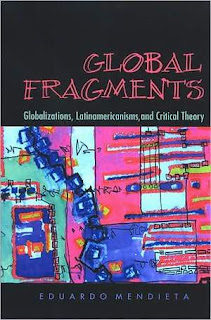Eduardo Mendieta: Global Fragments: Globalizations, Latinamericanisms, and Critical Theory (2007)
Filed under book | Tags: · critical theory, critique, ethics, globalisation, latin america, modernity, philosophy, postmodern, religion

Global Fragments offers an innovative analysis of globalization that aims to circumvent the sterile dichotomies that either praise or demonize globalization. Eduardo Mendieta applies an interdisciplinary approach to one of the most fundamental experiences of globalization: the mega-urbanization of humanity. The claim that globalization unsettles our epistemic maps of the world is tested against a study of Latin America. Mendieta also recontextualizes the work of three major theorists of globalization—Enrique Dussel, Cornel West, and Jürgen Habermas—to show how their thinking reflects engagement with central problems of globalization and, conversely, how globalization itself is exemplified through the reception of their work. Beyond the epistemic hubris of social theories that seek to accept or reject a globalized world, Mendieta calls for a dialogic cosmopolitanism that departs from the mutuality of teaching and learning in a world that is global but not totalized.
Publisher SUNY Press, 2007
ISBN 0791472574, 9780791472576
Length 226 pages
More info (publisher)
More info (google books)
Iain Thomson: Heidegger on Ontotheology. Technology and the Politics of Education (2005)
Filed under book | Tags: · critique, essentialism, hermeneutics, national socialism, nihilism, ontology, phenomenology, philosophy, philosophy of technology, technology

Heidegger is now widely recognized as one of the most influential and controversial philosophers of the twentieth century, yet much of his later philosophy remains shrouded in confusion and controversy. Restoring Heidegger’s understanding of metaphysics as ‘ontotheology’ to its rightful place at the center of his later thought, this book demonstrates the depth and significance of his controversial critique of technology, his appalling misadventure with Nazism, his prescient critique of the university, and his important philosophical suggestions for the future of higher education. It will be required reading for those seeking to understand the relationship between Heidegger’s philosophy and National Socialism, as well as the continuing relevance of his work.
• Examines the direct connection between Heidegger’s philosophy and his decision to join the National Socialist party in 1933 • Provides a clear reconstruction and defense of Heidegger’s later philosophy • Bridges the gap between continental and analytic philosophy
Publisher Cambridge University Press, 2005
ISBN 052161659X, 9780521616591
202 pages
PDF (updated on 2013-6-3)
Comment (1)Herbert Marcuse: Technology, War and Fascism (1998)
Filed under book | Tags: · 1940s, critical theory, critique, fascism, technology, war

Herbert Marcuse is one of the most influential thinkers of our time. Born in Berlin, Marcuse studied philosophy with Husserl and Heidegger at the Universities of Freiburg and Berlin. Marcuse’s critical social theory ingeniously fuses phenomenology, Freudian thought and Marxist theory; and provides a solid ground for his reputation as the most crucial figure inspiring the social activism and New Left politics of the 1960s and 1970s. The largely unpublished work collected in this volume makes clear the continuing relevance of Marcuse’s thought to contemporary issues. The texts published here, dealing with concerns during the period 1942-1951, exhibit penetrating critiques of technology and analyses of the ways that modern technology produces novel forms of society and culture with new modes of social control. The material collected in Technology, War and Facism provides exemplary attempts to link theory with practice, to develop ideas that can be used to grasp and transform existing social reality.
Technology, War and Fascism is the first of six volumes of Herbert Marcuse’s Collected Papers to be edited by Douglas Kellner. Each volume is a collection of previously un-published or uncollected essays, unfinished manuscripts and letters by one of the greatest thinkers of our time.
Editor Douglas Kellner
Publisher Routledge, 1998
ISBN 0415137802, 9780415137805
278 pages
PDF (updated on 2013-6-3)
Comment (1)
